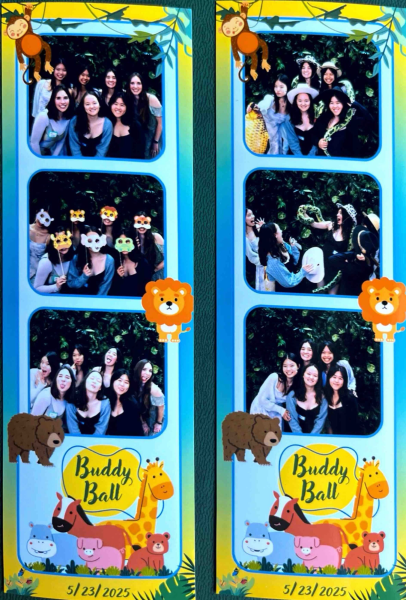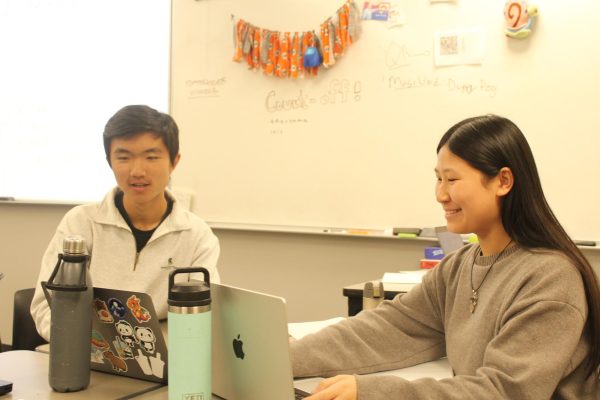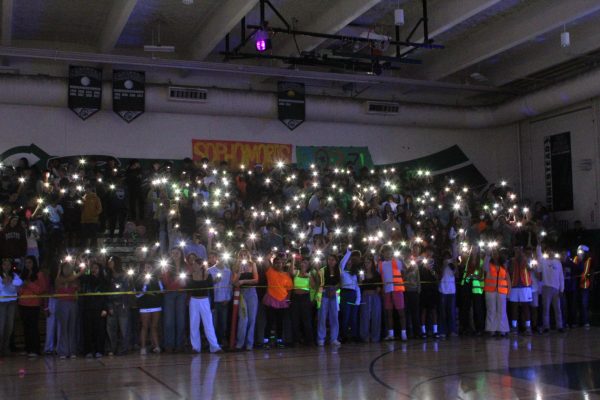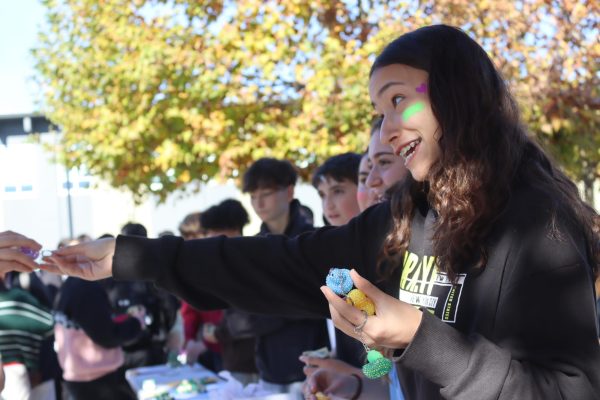Administration bans ‘Homestead Assassin’ game amidst safety concerns
Game ban raises questions of school jurisdiction on off-campus activities
Imitation weapons, stripping, videotaping without permission among safety concerns cited in banning of “Homestead Assassin”
The “Homestead Assassin” game was shut down by the administration last week due to potential safety issues and a violation of school rules, according to an email sent by principal Greg Giglio to the senior class on Feb. 12. Giglio said the competitive nature of the game could bring about potential safety and security concerns for students.
“There has been a reported history of negative things happening, such as security concerns, people getting injured, people looking like they’re kidnapping somebody,” Giglio said. “It basically becomes a matter of safety and security.”
“Homestead Assassin” is a game created by two seniors, for the senior class. Students who signed up to participate in the game were assigned another participating student to “eliminate” through the use of water balloons or nerf guns, game participant and senior Alex Wilson* said. In the end, the last one standing would be deemed the “winner” and would receive a sum of money, collected from all contestants.
“Homestead Assassin is something to do for fun before we all leave for college,” game participant and senior Samarth Dev said.
Senior Nalin Krishnan agrees, and said the game was intended to be just for fun.
“This game is not a safety concern,” Krishnan said. “Thinking that it is a safety concern is a vast overstatement. It’s really just seniors having fun.”
However, Giglio said the nature of the game, which involves shooting, was concerning, especially in a time of increased gun violence.
“The idea of playing a game about shooting people is huge and problematic in a time where school shootings are huge,” Giglio said. “What if somebody hears: ‘I’m going to kill this person tomorrow?’… that’s a threat to another person.”
Giglio said the game also breaks various rules on campus, including bringing an imitation firearm to school.
“Imitation firearms are not allowed anywhere near a campus. There was even some stuff written in [the game rules] about [how] you can’t be on campus between these hours and these hours,” Giglio said. “But, if you’re walking to school, with an imitation firearm at 7:30 in the morning … and you come onto campus with this imitation firearm — even if it’s a Nerf gun — you can be subject to consequences.”
However, Dev said, students were both made aware of the game rules and understand that school campuses are to be considered “safe zones,” and would not bring imitation firearms on campus.
“The game is completely innocent,” Dev said. “It’s totally fun [and] the game masters put a lot of effort into [creating] regulations [for the game] so that everyone stays safe. No one has ever brought a Nerf gun to campus, and no one’s even tried shooting someone on campus.”
Wilson said he understands the administration’s concerns over the use of Nerf guns, but does not believe the toys constitute immediate safety concerns, since they were created for children.
Game participant and senior Benjamin Smith* also confirmed the game was intended to be separate from campus, and that the rules specifically stated the game was to occur only in public spaces, such as parks.
“[The creators] completely took anything related to school out of it and nothing was taking place on campus,” Smith said. “You cannot break into any houses and you cannot do anything on private property. [They] were very clear in [their] Instagram and website that [the game was] not affiliated with Homestead.”
Wilson said there were rules against trespassing on private property during the game, and anyone who violated these rules would be eliminated from the game. Additionally, students were not assigned targets or sent messages regarding the game while on campus, Wilson said.
Yet, Giglio said the game involved illicit activities, like stripping, as well as videotaping someone without their permission.
“The rule about saying you have to strip down to your underwear, that’s a potential problem,” Giglio said. “Videotaping a person without their permission [and] … posting it online without their explicit permission can be a problem [as well].”
In addition, Giglio said that by collecting money to hand out to the winner of the game, students are entering a gray area regarding items that can legally be sold on campus. Furthermore, he said the game could also give rise to other issues, such as harassment, bullying, physical violence, physical injury and inappropriate language.
Additionally, Dean Steven Puccinelli said the game could result in school disruption.
However, Dev said he believes the game was not offensive and ensured there would not be a breach of privacy for those involved, as it was created with multiple rules and regulations in mind, to avoid such concerns.
“There wasn’t anything offensive about the game itself,” he said. “The people [who] created the game created so many regulations so that no laws were broken [and] law enforcement wouldn’t have to be called. Also, they didn’t want anything to happen on campus … There was a lot of thought put into [the game].”
Dev said even though the administration believes the game is dangerous, he believes it is considered within the limits of the law and is completely legal.
Dev cites the last four assassination videos, which showed students using legal methods to “assassinate” their targets, as examples. In the first video, Dev said, someone tricks a friend outside through the use of a mutual friend, while in another video, a student quickly “shoots” their target before they enter their house. In both scenarios, he said, there is no stalking or breaking and entering involved.
Participants and administration disagree over school jurisdiction
Students who were found to be participating in the game were called into the dean’s office to sign a form acknowledging that they had been spoken to and were aware of the repercussions of playing the game in the future, Giglio said.
Several students, including Krishnan and Smith, said they were told they must sign the form and that the form was considered a “contract,” stating they were aware of the consequences of continuing to play the game, or starting it up again at another time.
However, Giglio said the form students signed was not a contract.
“They [didn’t] need to sign it,” Giglio said. “It’s not like a [legal] contract. It is the idea of [acknowledging that the student and I discussed the game] and that I warned them that this game could have consequences.”
During their discussions with administration, a clear reason for why administration was shutting the game down was not given, other than potential safety concerns, Smith said.
However, those safety concerns are a legitimate reason, Puccinelli said.
“If a student were to participate in the game in a way that became detrimental to themselves or the school, we would intervene,” Puccinelli said. “We have responsibility from the time you leave your house to come to school, to the time you get back to your house and when you go home … even if you have an empty period and you’re off campus, that’s still in our school jurisdiction.”
Wilson disagrees and said the administration has unnecessarily deemed the game unsafe, and that it is not within their jurisdiction to control what students do off campus.
“One thing [they said was] unsafe in one of the videos was that one of the participants was walking on the street, but in that location, there’s no sidewalk; you have to walk on the street,” Wilson said. “So they’re using that as means to say it’s unsafe … but that also happened at 5 p.m. too, so I don’t see how they can say anything … I don’t see how the school has any jurisdiction over what you [do] in your pastime.”
Similar to Puccinelli, Giglio also said the school has jurisdiction over the activities students participate in outside of school if it connects back to and impacts the school. The school has a duty to keep students safe and must take action for students who have a connection with the school, he said.
Puccinelli said there could also be various legal issues caused by the game that could be tied back to the school.
“There are concerns about weapons [and] unsafe behavior on campus,” Puccinelli said. “There have been legal issues, car crashes, speeding, people breaking into houses [and] arrests. These are not things I’m making up. These are actual things that [have] happened.”
Participants believe outright ban of game is unfair due to lack of open dialogue
Smith said the administration has overstepped their boundaries by banning the game, and that many other schools did not take the step of flat-out stopping gameplay.
“This is more of how much power the school has over the private lives of students,” Smith said. “The game was completely not affiliated with school … [the creators were] pretty clear in all of [their] messaging. And we just think it’s unjust for the administration to shut down [some]thing that we were doing in our private lives.”
Had the administration given participants advice to make the game “safer,” such as changing the name of the game or the hours of participation, they would have taken that into consideration and made those changes, Smith said.
But instead, the game was shut down by administration without an open dialogue, which those involved in the game found frustrating and unfair, he said.
However, Mike Hiestand, a senior legal consultant at the Student Press Law Center said in an email, that the school’s ability to control a student’s off-campus activities is limited.
“It’s very clear that the school has overstepped its authority here. The school’s ability to control students’ off-campus conduct is limited,” Halstead said. “Unless they can show that the off campus conduct (or speech) has a direct and serious impact on campus – an impact that effectively prevents normal school activities from continuing – they have very little authority here and almost certainly have violated these students’ rights in making them sign these documents.”
The use of school name in the game an additional concern
Giglio said part of the problem lies in the use of the name “Homestead” in the game, since it indicates that it is a school-sponsored activity.
“You can’t use the name Homestead because what you’re doing is explicitly saying that the school is giving you permission to use that name,” Giglio said. “ [For example], if I’m a parent, and I don’t know any better [I might assume that the school is condoning the game based on its name].”
Smith said they didn’t approach administration before creating the game with the name “Homestead” because they didn’t believe getting permission was necessary for something meant to be played just for fun.
“The reason why we didn’t approach administration is because we thought that [this was going to be a] game that we’re playing among friends,” he said. “I [don’t] think we need to have an administration approve us if … we wanted to play tag with our friends or play football at the park.”
Yet, Wilson said they understand the administration’s concerns with using the name “Homestead” for the game, since it directly connects the game to the school. However, a more appropriate response from administration, he said, would have been to ask them to change the name of the game or make sure it wasn’t being played at school.
However, Giglio said even if the name had not included “Homestead,” it is still essentially affiliated with the school.
“There’s still plenty of things within this game that make it connected to Homestead,” Giglio said. “Simply changing the name doesn’t [fix] that.”
Game participants asked to sign form of acknowledgement; participants say form’s provisions are contradictory
The form students were asked to sign brings up a series of questions for participants, who felt they were being forced to sign something against their will, Wilson said.
Krishnan said he, along with several of his friends, were called in and asked to sign the “contract” and were told by dean Maria Trejo that students had to sign the form if they wanted to participate in graduation activities.
“[It isn’t great that they] included those provisions in there,” Krishnan said. “Either way, if I don’t sign it, I’ll end up falling to the same thing. I’ll have to do the same punishments as if I do sign it, and break the contract. There’s really no point in the contract in general, if you look at it like that.”
Wilson said he believes the form was more of a contract, since it said students would be suspended if they violated it. The contract also stated that students who signed it were agreeing not to play the assassin game or any other spin off of it in the future, he said.
“The contract said that you can’t play assassin or any[thing similar],” Wilson said.“I don’t understand how a minor can sign a contract, and if [you] violate the contract [then] you get suspended because they made it so vague that you really can’t do anything.”
Smith said students were told by the administration that their parents would be involved if they didn’t sign the form.
“If they refuse to sign it, administrators [said they would] call their parents and a lot of students [would] rather not have [their] parents get called in due to the hassle,” Smith said.
The administration also said students could face suspension if they refused to sign the contract, Wilson said.
“Some people asked them, ‘what happens if I don’t sign the contract or violate [it]?’ and they just straight up said that they have the power to suspend you,” Wilson said.
Wilson said the contract itself and discussions with Trejo were contradictory and did not clearly state when and what students were allowed to do.
“[The contract] said … that you can’t play assassin or any form of that game, but at the very end, when [a student asked] … ‘can we play this [different] type of nerf game that violates the contract?’ [The dean] also said, ‘[that’s] okay,’” Wilson said. “So where’s the boundary? She just said ‘yes’ to [the student’s question] but then it says on the contract that you’re gonna get suspended if you do anything like [the assassin game] again. So it just doesn’t make any sense.”
Giglio said regardless of the differences in student opinion, the game is harmful and could lead to bigger problems as seen in other schools across the nation.
“I’m sure there’s some people that would rather keep playing it,” Giglio said. “And you know, they choose to keep playing it and they know what they’re facing. There’s a lot of good court cases and a lot of good past history that would be on my side. Leveling [out] consequences and dealing with it in the way the school [did], we absolutely have jurisdiction in the situation. And all we’re trying to do is prevent people from making a big mistake.”
*Names have been changed to protect student’s request for anonymity













Edward Zen • Feb 16, 2020 at 10:26 pm
Another senior-related activity that have crossed the line. For the record, what about Touhou Project? While it is a Japanese video game series involving characters shooting each other, it’s popularity has later evolved into music and videos and all the internet phenomena. Even cosplays too